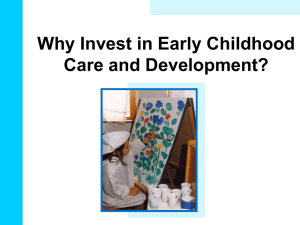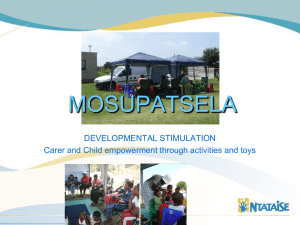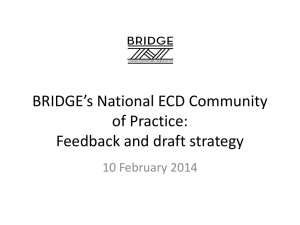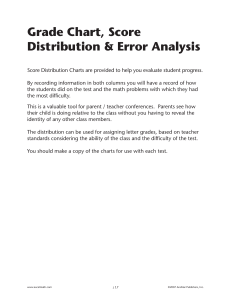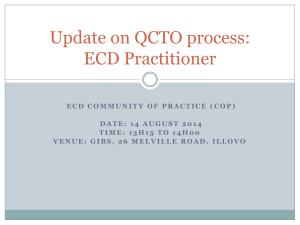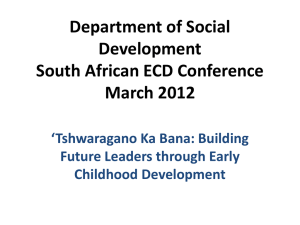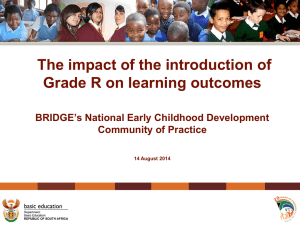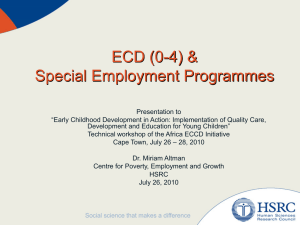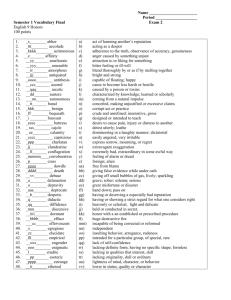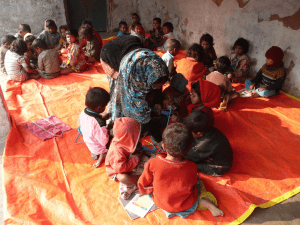System Assessment and Benchmarking for Education Results
advertisement
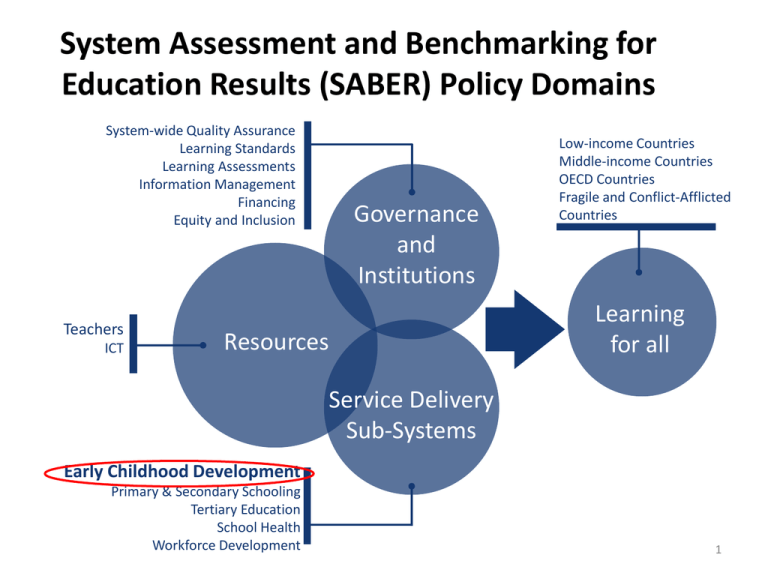
System Assessment and Benchmarking for Education Results (SABER) Policy Domains System-wide Quality Assurance Learning Standards Learning Assessments Information Management Financing Equity and Inclusion Teachers ICT Governance Governance and and Institutions Institutions Resources Low-income Countries Middle-income Countries OECD Countries Fragile and Conflict-Afflicted Countries Learning for all Service Delivery Sub-Systems Early Childhood Development Primary & Secondary Schooling Tertiary Education School Health Workforce Development 1 SABER- ECD Analytical Framework Establishing an Enabling Environment Implementing Widely Monitoring and Assuring Quality Policy Levers Legal Framework Intersectoral Coordination Finance Coverage Equity Area of Focus Outcome Effective ECD policies Policy Goals All children have the opportunity to reach their full potential ECD Information Quality Standards Compliance with Standards 2 SABER- ECD Process at the Country Level 1. Stocktake • Engage stakeholders in all relevant sectors • Use instruments with a multi-sectoral focus 2. Analyze 3. Identify Options • Use Program Typology to classify ECD programs • Identify countryspecific policy options to strengthen ECD • Use Rubric to classify ECD policies • Informed by international comparisons • Take stock of: • major ECD programs • ECD policies • International benchmarking Total time per country = 8-10 weeks • Produce Country Report and Presentation 3 Summary of ECD programs in Tanzania National Program for Most Vulnerable Children Preschools Complexity of institutional arrangements Coordinated interventions across multiple sectors PMTCT & Pediatric AIDS Care & Treatment Programs for children with special needs National Programs for Anemia, iodine deficiency, Vitamin A deficiency National Programs for maternal and child nutrition National Program for Care & Support of People Living with HIV Newborn and Child Health Program Immunization and Vaccine Development Sectoral MultiSectoral Comprehensive Example: Chile Crece Contigo Example: Cash transfers Cash transfers CrossSectoral Example: School feeding Focus Areas- Mechanisms Single sector Specific sector w/inputs from other sector Multiple sectors, specific programs for targeted or universal populations Comprehensive regular monitoring. Some universal services, with tailored interventions International Comparisons Level of Development ECD Policy Goal Policy Lever Establishing an Enabling Environment Tanzania Kenya Chile Ethiopia Sweden Turkey Uzbekistan Legal Framework lllm llmm lllm lllm llll lllm lllm Coordination lllm llll lllm llmm llll llmm llmm Financing N/A N/A === lmmm llll llmm llmm Coverage llmm llmm lllm lmmm llll llmm lllm Equity N/A N/A llmm N/A llll llmm llmm Area of Focus lllm lllm ==== llmm llll lllm llmm Implementing Widely Monitoring and Assuring Quality ECD Information llmm llmm lllm lmmm llll llmm llmm Quality Standards lllm lllm llmm llmm llll lllm llmm Compliance with Standards l lmm llmm llmm lmmm llll llmm llmm Legend: Latent Emerging Established Advanced SABER- ECD Implementation in Africa Country analysis planned in at least 30 countries: Legend: Data collected Data collection launching soon Angola Benin Burkina Faso Burundi Cameroon Cote D’Ivoire Eritrea Democratic Republic of Congo Ethiopia Gambia Ghana Kenya Lesotho Liberia Madagascar Malawi Mali Mauritania Mauritius Mozambique Namibia Nigeria Rwanda Senegal Seychelles Sierra Leone South Africa Tanzania Togo Uganda Zambia Zimbabwe Data collection planned

